|
2001-2003 Doris Duke Conservation Fellows
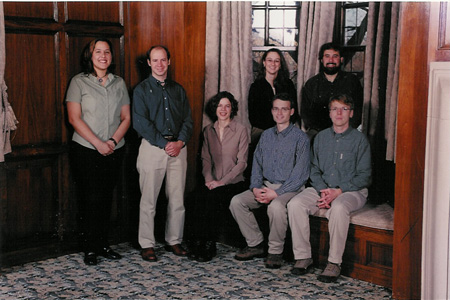
For more information on the Doris Duke Conservation Fellowships, please return to the Doris Duke Conservation Fellows Page.
Katia Aviles-Vazquez
Resource Ecology Management: Terrestrial Ecology
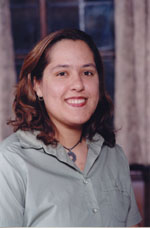 Born and raised in San Juan, PR, Katia did her undergraduate work at the State University of New York College of Environmental Science and Forestry in Syracuse. She majored in Environmental Studies with a concentration in Biological Applications, choosing this over Environmental and Forest Biology because she wanted something with a focus that was broad enough to cover the scientific and social aspects of current environmental problems. After graduation Katia worked in an organic farming cooperative with the local movement of rural landless workers (MST) and in a favela in the area of Recife, Brasil. When our work in Brasil finished, she moved back home to Puerto Rico to seek a job with a non-profit. One of the smallest non-profits in the island hired Katia to create three educational posters that are now in many Puerto Rican schools. After working with them for almost a year, Katia realized she needed more preparation to better help the development of a healthy conservation practice and management for Puerto Rico, so she restarted my academic work choosing this time a more scientific focus, Resource Ecology and Management - Terrestrial studies at the University of Michigan. Within this major, Katia is interested in the preservation of tropical areas and the sustainability and improvement of living conditions for the people that live in them. She wants to focus on how to better manage and in some cases restore landscapes, a task that becomes critical in the small area of Puerto Rico. Born and raised in San Juan, PR, Katia did her undergraduate work at the State University of New York College of Environmental Science and Forestry in Syracuse. She majored in Environmental Studies with a concentration in Biological Applications, choosing this over Environmental and Forest Biology because she wanted something with a focus that was broad enough to cover the scientific and social aspects of current environmental problems. After graduation Katia worked in an organic farming cooperative with the local movement of rural landless workers (MST) and in a favela in the area of Recife, Brasil. When our work in Brasil finished, she moved back home to Puerto Rico to seek a job with a non-profit. One of the smallest non-profits in the island hired Katia to create three educational posters that are now in many Puerto Rican schools. After working with them for almost a year, Katia realized she needed more preparation to better help the development of a healthy conservation practice and management for Puerto Rico, so she restarted my academic work choosing this time a more scientific focus, Resource Ecology and Management - Terrestrial studies at the University of Michigan. Within this major, Katia is interested in the preservation of tropical areas and the sustainability and improvement of living conditions for the people that live in them. She wants to focus on how to better manage and in some cases restore landscapes, a task that becomes critical in the small area of Puerto Rico.
Lisa Bobrowski
Landscape Architecture: Ecological Restoration
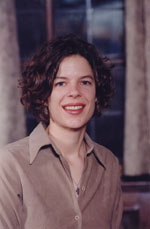 Lisa Bobrowski completed a B.S in Biology/Plant Ecology from Michigan Technological University in 1996. Following this, she joined the Peace Corps and served three years (through January 2000) as a volunteer in Paraguay. For the first two years, Lisa lived in a rural, small subsistent farming community working as an Agroforestry extensionist. Some of her activities included improving crop productivity and diversity through the use of green manure and promoting sustainable agroforestry systems to increase the families' economic stability. Lisa extended a year to participate in a "pioneer" program where she became one of the first volunteers in the Paraguayan Chaco. Here, she worked with a recently formed NGO, La Fundacion para el Desarrollo Sustentable del Chaco, in organizing and facilitating the organization's environmental education and community conservation programs throughout the region. Upon returning to the U.S., Lisa worked at a small landscaping firm in Grand Rapids, MI while readjusting to American culture and applying to graduate school. Currently she is in the Master's in Landscape Architecture program with an interest in ecological restoration, native plant landscapes and community involvement in these projects. Following graduation, Lisa would like to work in a small, community-based nonprofit organization or the local public sector in the Midwest. A possible long-term career goal is working for an international conservation organization. Lisa Bobrowski completed a B.S in Biology/Plant Ecology from Michigan Technological University in 1996. Following this, she joined the Peace Corps and served three years (through January 2000) as a volunteer in Paraguay. For the first two years, Lisa lived in a rural, small subsistent farming community working as an Agroforestry extensionist. Some of her activities included improving crop productivity and diversity through the use of green manure and promoting sustainable agroforestry systems to increase the families' economic stability. Lisa extended a year to participate in a "pioneer" program where she became one of the first volunteers in the Paraguayan Chaco. Here, she worked with a recently formed NGO, La Fundacion para el Desarrollo Sustentable del Chaco, in organizing and facilitating the organization's environmental education and community conservation programs throughout the region. Upon returning to the U.S., Lisa worked at a small landscaping firm in Grand Rapids, MI while readjusting to American culture and applying to graduate school. Currently she is in the Master's in Landscape Architecture program with an interest in ecological restoration, native plant landscapes and community involvement in these projects. Following graduation, Lisa would like to work in a small, community-based nonprofit organization or the local public sector in the Midwest. A possible long-term career goal is working for an international conservation organization.
Dave Chadwick
Resource Policy & Behavior: Policy
 Originally from South Dakota, Dave Chadwick graduated from Pomona College, in Claremont, California, with a bachelor's degree in Politics in 1995. While an undergraduate, Dave studied at University College, Oxford University, and interned in Washington DC for Senator Tom Daschle (D-South Dakota). After college, Dave returned to Washington and spent three and a half years on the staff of Senator Dianne Feinstein (D-California). During that time, he did everything from answering constituent mail to advising the Senator on a range of environmental and agricultural issues. Dave's background also includes work for the Citizens League, a nonpartisan citizen engagement think tank in Minnesota, and a season of stream surveying for the US Forest Service in northwest Colorado. While living in Minnesota, Dave was also an active volunteer with the Minnesota Land Trust and the US Fish and Wildlife Service. Dave is a first-year Master's student in the Resource Policy and Behavior program at the School of Natural Resources and Environment (SNRE), focusing on public land policy, land conservation, and citizen involvement in resource management. In addition to his coursework, Dave works as a research assistant at SNRE's Ecosystem Management Initiative. After completing a Master's degree, Dave intends to work for a public land management agency or a nonprofit organization to involve citizens and communities in resource management decisions. He is also interested in returning to the legislative arena to pursue policy changes to improve the overall management of our public lands and the coordination of public and private conservation initiatives across the landscape. Originally from South Dakota, Dave Chadwick graduated from Pomona College, in Claremont, California, with a bachelor's degree in Politics in 1995. While an undergraduate, Dave studied at University College, Oxford University, and interned in Washington DC for Senator Tom Daschle (D-South Dakota). After college, Dave returned to Washington and spent three and a half years on the staff of Senator Dianne Feinstein (D-California). During that time, he did everything from answering constituent mail to advising the Senator on a range of environmental and agricultural issues. Dave's background also includes work for the Citizens League, a nonpartisan citizen engagement think tank in Minnesota, and a season of stream surveying for the US Forest Service in northwest Colorado. While living in Minnesota, Dave was also an active volunteer with the Minnesota Land Trust and the US Fish and Wildlife Service. Dave is a first-year Master's student in the Resource Policy and Behavior program at the School of Natural Resources and Environment (SNRE), focusing on public land policy, land conservation, and citizen involvement in resource management. In addition to his coursework, Dave works as a research assistant at SNRE's Ecosystem Management Initiative. After completing a Master's degree, Dave intends to work for a public land management agency or a nonprofit organization to involve citizens and communities in resource management decisions. He is also interested in returning to the legislative arena to pursue policy changes to improve the overall management of our public lands and the coordination of public and private conservation initiatives across the landscape.
Steve Higgs
Resource Policy & Behavior: Policy & Conservation Biology and Ecosystem Management
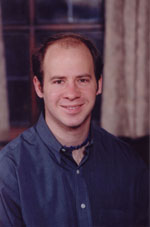 Steve Higgs graduated from Colby College with a B.A. in Biology and International Environmental Policy in 1998. He is currently pursuing an M.S. in Natural Resource Policy and Behavior and a J.D. in international and comparative environmental law. Steve's academic and professional interests involve collaborative natural resource management, mediation, and environmental education. Prior to attending the University of Michigan, he lived in Washington, DC, where he worked for American Rivers in their dam removal program. He also served as a Research Assistant for Project Performance Corporation providing regulatory training and information technology services for the Environmental Protection Agency and Department of Energy. Before moving to DC, Steve taught environmental education with various non-governmental organizations in Latin America, including the Belize Audubon Society, The Creative Learning Center of Costa Rica, The Wildlife Conservation Society of Bolivia, and the Mazán Ecological Foundation of Ecuador. He also served as president of an environmental advocacy group in college and directed a three-year fund-raising campaign to support national programs in environmental education. After graduating from the University, Steve would like to work as an attorney in a non-profit environmental law firm. His long-range goals involve working for a national or international environmental organization advocating for policies to conserve biodiversity as well as gaining additional experience in mediating natural resource disputes. He also plans on teaching environmental law and collaborative natural resource management at the college level and hopes to complete a book highlighting motivational stories of ordinary people achieving extraordinary conservation successes. Steve Higgs graduated from Colby College with a B.A. in Biology and International Environmental Policy in 1998. He is currently pursuing an M.S. in Natural Resource Policy and Behavior and a J.D. in international and comparative environmental law. Steve's academic and professional interests involve collaborative natural resource management, mediation, and environmental education. Prior to attending the University of Michigan, he lived in Washington, DC, where he worked for American Rivers in their dam removal program. He also served as a Research Assistant for Project Performance Corporation providing regulatory training and information technology services for the Environmental Protection Agency and Department of Energy. Before moving to DC, Steve taught environmental education with various non-governmental organizations in Latin America, including the Belize Audubon Society, The Creative Learning Center of Costa Rica, The Wildlife Conservation Society of Bolivia, and the Mazán Ecological Foundation of Ecuador. He also served as president of an environmental advocacy group in college and directed a three-year fund-raising campaign to support national programs in environmental education. After graduating from the University, Steve would like to work as an attorney in a non-profit environmental law firm. His long-range goals involve working for a national or international environmental organization advocating for policies to conserve biodiversity as well as gaining additional experience in mediating natural resource disputes. He also plans on teaching environmental law and collaborative natural resource management at the college level and hopes to complete a book highlighting motivational stories of ordinary people achieving extraordinary conservation successes.
Jeremy Moghtader
Resource Ecology Management: Terrestrial Ecology
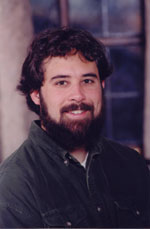 Jeremy graduated from the University of Michiagn in 1998 with a BS in economics and coursework that included biology and ecology classes. He then worked for the Washington State Department of Fish and Wildlife as an Americorps volunteer conducting salmon surveys for ESA listings. He also worked for a short time for a small environmental consulting firm specializing in recycling at the private, municipal and regional levels. Currently, Jeremy is a first year student in the Resource Ecology Management program studying landscape diversity in agricultural lands as it relates to biodiversity and ecosystem function. He is interested in the benefits of diversified landscapes in teersm of both sustainable agriculture prodiction and healthy ecosystems for people, plants and wildlife. After graduation, Jeremy plans to work with local and regional organizations to implement conservation plans for rural areas which reflect our best understanding of ecological principals and meet the social and economic needs of the community. He would like to increase awareness of conservation needs at both the local and national levels and engage people in collaborative efforts to meet these needs. Jeremy graduated from the University of Michiagn in 1998 with a BS in economics and coursework that included biology and ecology classes. He then worked for the Washington State Department of Fish and Wildlife as an Americorps volunteer conducting salmon surveys for ESA listings. He also worked for a short time for a small environmental consulting firm specializing in recycling at the private, municipal and regional levels. Currently, Jeremy is a first year student in the Resource Ecology Management program studying landscape diversity in agricultural lands as it relates to biodiversity and ecosystem function. He is interested in the benefits of diversified landscapes in teersm of both sustainable agriculture prodiction and healthy ecosystems for people, plants and wildlife. After graduation, Jeremy plans to work with local and regional organizations to implement conservation plans for rural areas which reflect our best understanding of ecological principals and meet the social and economic needs of the community. He would like to increase awareness of conservation needs at both the local and national levels and engage people in collaborative efforts to meet these needs.
Melinda Murch
Resource Policy & Behavior: Policy
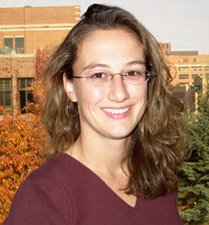 Mindy is student in the Corporate Environmental Management Program, a dual masters program between the School of Natural Resources and Environment and the Business School at the University of Michigan. Mindy graduated from Bowdoin College with a Bachelors of Arts in Russian studies and a minor in economics. After graduation, she worked for PricewaterhouseCoopers in the Government Consulting Practice where she conducted strategic planning, financial, process, and organizational analyses. Her clients included the Administrative Office of the United States Courts, the Immigration and Naturalization Service, and the Forest Service. In March of 2000, Mindy left PricewaterhouseCoopers to work for the Forest Service as a strategic planner on the Roadless Area Conservation Rulemaking, an effort to protect almost 59 million acres of public lands from road building and timber harvest. This summer, Mindy developed a watershed assessment for a portion of Admiralty Island on the Tongass National Forest in Alaska. Her efforts focused on the analysis of social and economic issues of a Native Alaska tribe. Upon graduation, Mindy hopes to attain a management role in a government agency or non-profit organization working on rural economic development or land management issues. Mindy is student in the Corporate Environmental Management Program, a dual masters program between the School of Natural Resources and Environment and the Business School at the University of Michigan. Mindy graduated from Bowdoin College with a Bachelors of Arts in Russian studies and a minor in economics. After graduation, she worked for PricewaterhouseCoopers in the Government Consulting Practice where she conducted strategic planning, financial, process, and organizational analyses. Her clients included the Administrative Office of the United States Courts, the Immigration and Naturalization Service, and the Forest Service. In March of 2000, Mindy left PricewaterhouseCoopers to work for the Forest Service as a strategic planner on the Roadless Area Conservation Rulemaking, an effort to protect almost 59 million acres of public lands from road building and timber harvest. This summer, Mindy developed a watershed assessment for a portion of Admiralty Island on the Tongass National Forest in Alaska. Her efforts focused on the analysis of social and economic issues of a Native Alaska tribe. Upon graduation, Mindy hopes to attain a management role in a government agency or non-profit organization working on rural economic development or land management issues.
Joseph Short
Resource Ecology & Management: Conservation Biology and Ecosystem Management
 Joseph Short graduated from Carleton College with a B.A. in Biology in 1997. While at Carleton he pursued coursework and experiences related to ecological restoration and responsible stewardship of our natural resources. He led and worked on prairie restoration crews in the college's 800-acre arboretum, and became active in campus politics as an advocate for environmentally responsible design in new campus building projects. He also served as the president of the Farm Club and as a teaching assistant for a course in sustainable agriculture. After graduation Joe spent over three years working for The Nature Conservancy, first as preserve management assistant in Nebraska and then as a restoration specialist in northern California. His primary duties included the planning and management of riparian, aquatic, and grassland restoration projects, the construction and maintenance of a large GIS, and the coordination of local outreach programs and volunteer training. The goal of this work was to incorporate conservation into the workings of the local community, by demonstrating conservation techniques compatible with other land uses such as ranching. Here at SNRE Joe is working to further develop his skills as a facilitator of community-based conservation. His focus is on landscape-scale resource planning and restoration, and he is part of a master's project team that is facilitating a watershed restoration effort along the Shiawassee River. After graduation Joe anticipates returning to The Nature Conservancy or a similar organization as a project director. Joseph Short graduated from Carleton College with a B.A. in Biology in 1997. While at Carleton he pursued coursework and experiences related to ecological restoration and responsible stewardship of our natural resources. He led and worked on prairie restoration crews in the college's 800-acre arboretum, and became active in campus politics as an advocate for environmentally responsible design in new campus building projects. He also served as the president of the Farm Club and as a teaching assistant for a course in sustainable agriculture. After graduation Joe spent over three years working for The Nature Conservancy, first as preserve management assistant in Nebraska and then as a restoration specialist in northern California. His primary duties included the planning and management of riparian, aquatic, and grassland restoration projects, the construction and maintenance of a large GIS, and the coordination of local outreach programs and volunteer training. The goal of this work was to incorporate conservation into the workings of the local community, by demonstrating conservation techniques compatible with other land uses such as ranching. Here at SNRE Joe is working to further develop his skills as a facilitator of community-based conservation. His focus is on landscape-scale resource planning and restoration, and he is part of a master's project team that is facilitating a watershed restoration effort along the Shiawassee River. After graduation Joe anticipates returning to The Nature Conservancy or a similar organization as a project director.
|



 Born and raised in San Juan, PR, Katia did her undergraduate work at the State University of New York College of Environmental Science and Forestry in Syracuse. She majored in Environmental Studies with a concentration in Biological Applications, choosing this over Environmental and Forest Biology because she wanted something with a focus that was broad enough to cover the scientific and social aspects of current environmental problems. After graduation Katia worked in an organic farming cooperative with the local movement of rural landless workers (MST) and in a favela in the area of Recife, Brasil. When our work in Brasil finished, she moved back home to Puerto Rico to seek a job with a non-profit. One of the smallest non-profits in the island hired Katia to create three educational posters that are now in many Puerto Rican schools. After working with them for almost a year, Katia realized she needed more preparation to better help the development of a healthy conservation practice and management for Puerto Rico, so she restarted my academic work choosing this time a more scientific focus, Resource Ecology and Management - Terrestrial studies at the University of Michigan. Within this major, Katia is interested in the preservation of tropical areas and the sustainability and improvement of living conditions for the people that live in them. She wants to focus on how to better manage and in some cases restore landscapes, a task that becomes critical in the small area of Puerto Rico.
Born and raised in San Juan, PR, Katia did her undergraduate work at the State University of New York College of Environmental Science and Forestry in Syracuse. She majored in Environmental Studies with a concentration in Biological Applications, choosing this over Environmental and Forest Biology because she wanted something with a focus that was broad enough to cover the scientific and social aspects of current environmental problems. After graduation Katia worked in an organic farming cooperative with the local movement of rural landless workers (MST) and in a favela in the area of Recife, Brasil. When our work in Brasil finished, she moved back home to Puerto Rico to seek a job with a non-profit. One of the smallest non-profits in the island hired Katia to create three educational posters that are now in many Puerto Rican schools. After working with them for almost a year, Katia realized she needed more preparation to better help the development of a healthy conservation practice and management for Puerto Rico, so she restarted my academic work choosing this time a more scientific focus, Resource Ecology and Management - Terrestrial studies at the University of Michigan. Within this major, Katia is interested in the preservation of tropical areas and the sustainability and improvement of living conditions for the people that live in them. She wants to focus on how to better manage and in some cases restore landscapes, a task that becomes critical in the small area of Puerto Rico. Lisa Bobrowski completed a B.S in Biology/Plant Ecology from Michigan Technological University in 1996. Following this, she joined the Peace Corps and served three years (through January 2000) as a volunteer in Paraguay. For the first two years, Lisa lived in a rural, small subsistent farming community working as an Agroforestry extensionist. Some of her activities included improving crop productivity and diversity through the use of green manure and promoting sustainable agroforestry systems to increase the families' economic stability. Lisa extended a year to participate in a "pioneer" program where she became one of the first volunteers in the Paraguayan Chaco. Here, she worked with a recently formed NGO, La Fundacion para el Desarrollo Sustentable del Chaco, in organizing and facilitating the organization's environmental education and community conservation programs throughout the region. Upon returning to the U.S., Lisa worked at a small landscaping firm in Grand Rapids, MI while readjusting to American culture and applying to graduate school. Currently she is in the Master's in Landscape Architecture program with an interest in ecological restoration, native plant landscapes and community involvement in these projects. Following graduation, Lisa would like to work in a small, community-based nonprofit organization or the local public sector in the Midwest. A possible long-term career goal is working for an international conservation organization.
Lisa Bobrowski completed a B.S in Biology/Plant Ecology from Michigan Technological University in 1996. Following this, she joined the Peace Corps and served three years (through January 2000) as a volunteer in Paraguay. For the first two years, Lisa lived in a rural, small subsistent farming community working as an Agroforestry extensionist. Some of her activities included improving crop productivity and diversity through the use of green manure and promoting sustainable agroforestry systems to increase the families' economic stability. Lisa extended a year to participate in a "pioneer" program where she became one of the first volunteers in the Paraguayan Chaco. Here, she worked with a recently formed NGO, La Fundacion para el Desarrollo Sustentable del Chaco, in organizing and facilitating the organization's environmental education and community conservation programs throughout the region. Upon returning to the U.S., Lisa worked at a small landscaping firm in Grand Rapids, MI while readjusting to American culture and applying to graduate school. Currently she is in the Master's in Landscape Architecture program with an interest in ecological restoration, native plant landscapes and community involvement in these projects. Following graduation, Lisa would like to work in a small, community-based nonprofit organization or the local public sector in the Midwest. A possible long-term career goal is working for an international conservation organization.  Originally from South Dakota, Dave Chadwick graduated from Pomona College, in Claremont, California, with a bachelor's degree in Politics in 1995. While an undergraduate, Dave studied at University College, Oxford University, and interned in Washington DC for Senator Tom Daschle (D-South Dakota). After college, Dave returned to Washington and spent three and a half years on the staff of Senator Dianne Feinstein (D-California). During that time, he did everything from answering constituent mail to advising the Senator on a range of environmental and agricultural issues. Dave's background also includes work for the Citizens League, a nonpartisan citizen engagement think tank in Minnesota, and a season of stream surveying for the US Forest Service in northwest Colorado. While living in Minnesota, Dave was also an active volunteer with the Minnesota Land Trust and the US Fish and Wildlife Service. Dave is a first-year Master's student in the Resource Policy and Behavior program at the School of Natural Resources and Environment (SNRE), focusing on public land policy, land conservation, and citizen involvement in resource management. In addition to his coursework, Dave works as a research assistant at SNRE's Ecosystem Management Initiative. After completing a Master's degree, Dave intends to work for a public land management agency or a nonprofit organization to involve citizens and communities in resource management decisions. He is also interested in returning to the legislative arena to pursue policy changes to improve the overall management of our public lands and the coordination of public and private conservation initiatives across the landscape.
Originally from South Dakota, Dave Chadwick graduated from Pomona College, in Claremont, California, with a bachelor's degree in Politics in 1995. While an undergraduate, Dave studied at University College, Oxford University, and interned in Washington DC for Senator Tom Daschle (D-South Dakota). After college, Dave returned to Washington and spent three and a half years on the staff of Senator Dianne Feinstein (D-California). During that time, he did everything from answering constituent mail to advising the Senator on a range of environmental and agricultural issues. Dave's background also includes work for the Citizens League, a nonpartisan citizen engagement think tank in Minnesota, and a season of stream surveying for the US Forest Service in northwest Colorado. While living in Minnesota, Dave was also an active volunteer with the Minnesota Land Trust and the US Fish and Wildlife Service. Dave is a first-year Master's student in the Resource Policy and Behavior program at the School of Natural Resources and Environment (SNRE), focusing on public land policy, land conservation, and citizen involvement in resource management. In addition to his coursework, Dave works as a research assistant at SNRE's Ecosystem Management Initiative. After completing a Master's degree, Dave intends to work for a public land management agency or a nonprofit organization to involve citizens and communities in resource management decisions. He is also interested in returning to the legislative arena to pursue policy changes to improve the overall management of our public lands and the coordination of public and private conservation initiatives across the landscape. Steve Higgs graduated from Colby College with a B.A. in Biology and International Environmental Policy in 1998. He is currently pursuing an M.S. in Natural Resource Policy and Behavior and a J.D. in international and comparative environmental law. Steve's academic and professional interests involve collaborative natural resource management, mediation, and environmental education. Prior to attending the University of Michigan, he lived in Washington, DC, where he worked for American Rivers in their dam removal program. He also served as a Research Assistant for Project Performance Corporation providing regulatory training and information technology services for the Environmental Protection Agency and Department of Energy. Before moving to DC, Steve taught environmental education with various non-governmental organizations in Latin America, including the Belize Audubon Society, The Creative Learning Center of Costa Rica, The Wildlife Conservation Society of Bolivia, and the Mazán Ecological Foundation of Ecuador. He also served as president of an environmental advocacy group in college and directed a three-year fund-raising campaign to support national programs in environmental education. After graduating from the University, Steve would like to work as an attorney in a non-profit environmental law firm. His long-range goals involve working for a national or international environmental organization advocating for policies to conserve biodiversity as well as gaining additional experience in mediating natural resource disputes. He also plans on teaching environmental law and collaborative natural resource management at the college level and hopes to complete a book highlighting motivational stories of ordinary people achieving extraordinary conservation successes.
Steve Higgs graduated from Colby College with a B.A. in Biology and International Environmental Policy in 1998. He is currently pursuing an M.S. in Natural Resource Policy and Behavior and a J.D. in international and comparative environmental law. Steve's academic and professional interests involve collaborative natural resource management, mediation, and environmental education. Prior to attending the University of Michigan, he lived in Washington, DC, where he worked for American Rivers in their dam removal program. He also served as a Research Assistant for Project Performance Corporation providing regulatory training and information technology services for the Environmental Protection Agency and Department of Energy. Before moving to DC, Steve taught environmental education with various non-governmental organizations in Latin America, including the Belize Audubon Society, The Creative Learning Center of Costa Rica, The Wildlife Conservation Society of Bolivia, and the Mazán Ecological Foundation of Ecuador. He also served as president of an environmental advocacy group in college and directed a three-year fund-raising campaign to support national programs in environmental education. After graduating from the University, Steve would like to work as an attorney in a non-profit environmental law firm. His long-range goals involve working for a national or international environmental organization advocating for policies to conserve biodiversity as well as gaining additional experience in mediating natural resource disputes. He also plans on teaching environmental law and collaborative natural resource management at the college level and hopes to complete a book highlighting motivational stories of ordinary people achieving extraordinary conservation successes. Jeremy graduated from the University of Michiagn in 1998 with a BS in economics and coursework that included biology and ecology classes. He then worked for the Washington State Department of Fish and Wildlife as an Americorps volunteer conducting salmon surveys for ESA listings. He also worked for a short time for a small environmental consulting firm specializing in recycling at the private, municipal and regional levels. Currently, Jeremy is a first year student in the Resource Ecology Management program studying landscape diversity in agricultural lands as it relates to biodiversity and ecosystem function. He is interested in the benefits of diversified landscapes in teersm of both sustainable agriculture prodiction and healthy ecosystems for people, plants and wildlife. After graduation, Jeremy plans to work with local and regional organizations to implement conservation plans for rural areas which reflect our best understanding of ecological principals and meet the social and economic needs of the community. He would like to increase awareness of conservation needs at both the local and national levels and engage people in collaborative efforts to meet these needs.
Jeremy graduated from the University of Michiagn in 1998 with a BS in economics and coursework that included biology and ecology classes. He then worked for the Washington State Department of Fish and Wildlife as an Americorps volunteer conducting salmon surveys for ESA listings. He also worked for a short time for a small environmental consulting firm specializing in recycling at the private, municipal and regional levels. Currently, Jeremy is a first year student in the Resource Ecology Management program studying landscape diversity in agricultural lands as it relates to biodiversity and ecosystem function. He is interested in the benefits of diversified landscapes in teersm of both sustainable agriculture prodiction and healthy ecosystems for people, plants and wildlife. After graduation, Jeremy plans to work with local and regional organizations to implement conservation plans for rural areas which reflect our best understanding of ecological principals and meet the social and economic needs of the community. He would like to increase awareness of conservation needs at both the local and national levels and engage people in collaborative efforts to meet these needs. Mindy is student in the Corporate Environmental Management Program, a dual masters program between the School of Natural Resources and Environment and the Business School at the University of Michigan. Mindy graduated from Bowdoin College with a Bachelors of Arts in Russian studies and a minor in economics. After graduation, she worked for PricewaterhouseCoopers in the Government Consulting Practice where she conducted strategic planning, financial, process, and organizational analyses. Her clients included the Administrative Office of the United States Courts, the Immigration and Naturalization Service, and the Forest Service. In March of 2000, Mindy left PricewaterhouseCoopers to work for the Forest Service as a strategic planner on the Roadless Area Conservation Rulemaking, an effort to protect almost 59 million acres of public lands from road building and timber harvest. This summer, Mindy developed a watershed assessment for a portion of Admiralty Island on the Tongass National Forest in Alaska. Her efforts focused on the analysis of social and economic issues of a Native Alaska tribe. Upon graduation, Mindy hopes to attain a management role in a government agency or non-profit organization working on rural economic development or land management issues.
Mindy is student in the Corporate Environmental Management Program, a dual masters program between the School of Natural Resources and Environment and the Business School at the University of Michigan. Mindy graduated from Bowdoin College with a Bachelors of Arts in Russian studies and a minor in economics. After graduation, she worked for PricewaterhouseCoopers in the Government Consulting Practice where she conducted strategic planning, financial, process, and organizational analyses. Her clients included the Administrative Office of the United States Courts, the Immigration and Naturalization Service, and the Forest Service. In March of 2000, Mindy left PricewaterhouseCoopers to work for the Forest Service as a strategic planner on the Roadless Area Conservation Rulemaking, an effort to protect almost 59 million acres of public lands from road building and timber harvest. This summer, Mindy developed a watershed assessment for a portion of Admiralty Island on the Tongass National Forest in Alaska. Her efforts focused on the analysis of social and economic issues of a Native Alaska tribe. Upon graduation, Mindy hopes to attain a management role in a government agency or non-profit organization working on rural economic development or land management issues.  Joseph Short graduated from Carleton College with a B.A. in Biology in 1997. While at Carleton he pursued coursework and experiences related to ecological restoration and responsible stewardship of our natural resources. He led and worked on prairie restoration crews in the college's 800-acre arboretum, and became active in campus politics as an advocate for environmentally responsible design in new campus building projects. He also served as the president of the Farm Club and as a teaching assistant for a course in sustainable agriculture. After graduation Joe spent over three years working for The Nature Conservancy, first as preserve management assistant in Nebraska and then as a restoration specialist in northern California. His primary duties included the planning and management of riparian, aquatic, and grassland restoration projects, the construction and maintenance of a large GIS, and the coordination of local outreach programs and volunteer training. The goal of this work was to incorporate conservation into the workings of the local community, by demonstrating conservation techniques compatible with other land uses such as ranching. Here at SNRE Joe is working to further develop his skills as a facilitator of community-based conservation. His focus is on landscape-scale resource planning and restoration, and he is part of a master's project team that is facilitating a watershed restoration effort along the Shiawassee River. After graduation Joe anticipates returning to The Nature Conservancy or a similar organization as a project director.
Joseph Short graduated from Carleton College with a B.A. in Biology in 1997. While at Carleton he pursued coursework and experiences related to ecological restoration and responsible stewardship of our natural resources. He led and worked on prairie restoration crews in the college's 800-acre arboretum, and became active in campus politics as an advocate for environmentally responsible design in new campus building projects. He also served as the president of the Farm Club and as a teaching assistant for a course in sustainable agriculture. After graduation Joe spent over three years working for The Nature Conservancy, first as preserve management assistant in Nebraska and then as a restoration specialist in northern California. His primary duties included the planning and management of riparian, aquatic, and grassland restoration projects, the construction and maintenance of a large GIS, and the coordination of local outreach programs and volunteer training. The goal of this work was to incorporate conservation into the workings of the local community, by demonstrating conservation techniques compatible with other land uses such as ranching. Here at SNRE Joe is working to further develop his skills as a facilitator of community-based conservation. His focus is on landscape-scale resource planning and restoration, and he is part of a master's project team that is facilitating a watershed restoration effort along the Shiawassee River. After graduation Joe anticipates returning to The Nature Conservancy or a similar organization as a project director.